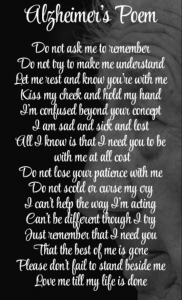A Message for Families and Caregivers Coping with the Effects of Alzheimer’s Disease
To view in a different language, please download this free app from Google Play Store
OR also a free translator with no downloading required:
A little about myself:
My name is Kimberly Duttry. I was a Certified Nurse’s Assistant specializing in the care of Alzheimer’s residents in geriatric facilities in California for fifteen years. My knowledge of the internal experience of the families, the person affected by Alzheimer’s, and the caregivers will help you to understand and cope with the effects of Alzheimer’s disease. My knowledge was acquired through observation, one on one personal care, family interaction and personal research. My goal of this website is to help you to understand and empathize with those who are suffering with this disease. Through this understanding, it will help your loved ones gain the enhanced quality of life that they truly deserve and bring comfort to you by offering knowledge, coping skills, and support for this difficult journey you are on.
Remember, a person with Alzheimer’s disease is not in control of behavioral responses. Their cognitive abilities are damaged by the progression of the disease within the brain. They are not purposefully “being mean or difficult”.
Understanding this will help their caregiver, family, and friends have patience and empathy toward them. People with the disease have a hard time expressing how they feel. So it is up to the caregiver, family, or doctor, to try to identify the cause and how the behavior they are displaying may relate to the experience happening at the moment. Perhaps they are agitated or upset because of internal factors, such as not feeling well, being either too hot or too cold, or maybe the sock on their foot is sliding down into their shoe causing discomfort. However, they are not able to verbalize their discomfort. Or perhaps it is an external experience occurring that is causing the disturbance of behavior. Such as moving to a new place, the furniture being moved in a familiar environment, changes in caregivers, or being asked to change their clothes or bathe.
 Alzheimer’s disease is hard on everyone. The patient, the family, friends, and caregivers. But, it is hardest on the one afflicted with the disease.
Alzheimer’s disease is hard on everyone. The patient, the family, friends, and caregivers. But, it is hardest on the one afflicted with the disease.
Without the ability to make sense of their already confusing world, lacking the ability to communicate and identify discomforts, and losing the ability to be independent in their personal care needs, a person with Alzheimer’s loses all control of their lives. By acknowledging these conditions of this horrible disease and what may trigger behavioral conflicts, there are different methods we can use to create an environment of physical and emotional comfort. Helping to resolve any challenges or obstacles that cause them turmoil.
Please take note of the menu at the top right corner to take you to all of the eleven pages on my site.
Coping tips
Do NOT take their behavior as a personal attack against you. With the lack of cognitive ability to express their distress, behaviors may increase. Just as a non-communicative infant or child displays behaviors or crying to express their distress, a person with Alzheimer’s may display behaviors to communicate.
Look for reasons for behavior change. Investigate and try to figure out why their behavior changed. By identifying the underlying cause, you can help to avoid further behaviors and help to resolve the discomfort for them. Wouldn’t it be frustrating not being able to identify or express yourself?
Avoid confrontations or arguments. Alzheimer’s patients are confused, they feel unsafe without the ability to make sense of what is going on around them. Arguing with them or pointing out a mistake that they made and criticizing them, will increase the agitation and feelings of helplessness, making a behavior spin out of control. Think about it, when someone confronts you or argues with you, how do you feel?
Redirecting their attention. People afflicted with Alzheimer’s disease have impaired memory function. By redirecting their attention, it can change the situation from a negative outcome to a positive outcome.
Calm environment. Having a calm environment creates peace within us all. People affected by Alzheimer’s may have sensory functions that are heightened in visual and auditory abilities. In other words, too much noise, glare from the sun shining in and reflecting off of an object, or too much clutter in their environment, such as excessive furnishings, may also increase confusion and irritability.
Allow adequate rest. By allowing adequate rest between stimulating events, it allows them the ability to “recharge” and recuperate.
Provide a security object. People with Alzheimer’s feel unsafe, nothing seems stable or secure in their world of confusion. By providing a familiar or favorite object, it will help them to feel a little more secure and decrease agitation and anxiety.
Share your experience with others. Helping others to understand Alzheimer’s disease by sharing your knowledge and experience will help educate them so that they may understand the effects of this disease and will help provide support and comfort for all involved. It will help promote quality care to those suffering from this disease. It will also provide alternative methods to help others cope with the disease and its progression.
Provide reassurance. Acknowledge them and their feelings. Be empathetic to their experience by saying things like “I am sorry you are upset” or “I will stay with you until you are feeling better”. Let them know they are “safe” and that you are there to help them. Involve them in activities that are productive, even if it is folding laundry, matching socks, stirring up ingredients in a bowl for a meal. This will help with anxiety and help them feel more accomplished. Give them two choices for their care, such as, “would you like to take your shower now or after breakfast”, this will help them feel more in control of their personal care. Explain to them what you are going to do with them before you do it and remind them while you are doing it. For instance, “I am going to help you with your shower now.” As you begin to remove their clothing, explain to them, “let’s take off your shirt for your shower” and continue with this method while undressing them. While you are continuing their care in the shower, ask them if the temperature of the water feels okay, continue giving prompts to the washing process as you help them wash their body. Such as saying, “okay I am going to help you wash your back, can you turn around for me?”, and continue doing this throughout the shower. Patients forget quickly and they may feel as if you are trying to violate them if you don’t continue to explain what you’re doing. They may become frightened easily, so by explaining, you are diminishing the aspect of fear and anxiety and providing continuing reassurance. Always ask their permission before providing their care.
People with Alzheimer’s disease are not the disease itself and should not be defined as such. They are people just like you and I, but are suffering from a brain disease that is incurable and debilitating. They deserve the same dignity, respect, and love that we all do. They deserve to feel safe and secure. They deserve patience, understanding, and empathy. They deserve to feel like they are productive in their activities of daily life. They deserve for us to help them feel these things and to feel happy, just as we all do as human beings. All of these things will enhance their quality of life and reduce anxiety, depression, and agitation.
To all caregivers, family members, and friends of someone suffering from Alzheimer’s disease, I know it is hard. I know it’s devastating to see your loved one mentally and physically decline. Remember, it’s even harder for them. Resources are available to you, providing support to help you deal and cope with this disease.
We, as caregivers and loved ones, are the only ones that can help them with support. We are all they have. Be patient, be kind. Help them to achieve good quality of life. Enjoy them while they are still here with you. Play music that they enjoy and dance with them. Provide enjoyable activities. I have included two extra pages on this website to help with ideas for activities, the therapeutic benefits from these activities AND a page to help you with training techniques, equipped with YouTube videos.
Bring them happiness, that make them smile or laugh. Most of all, love them! Namaste! 🙂
